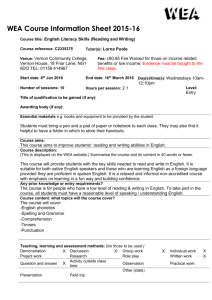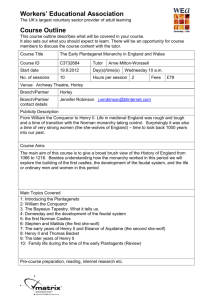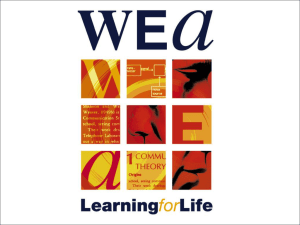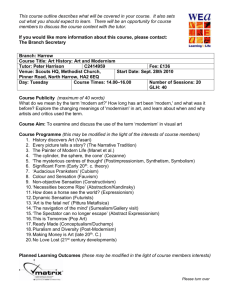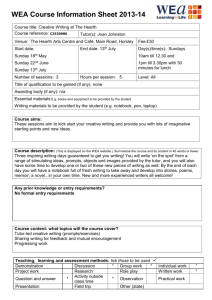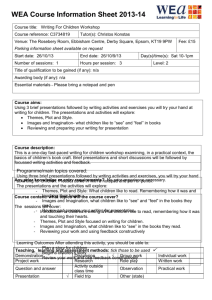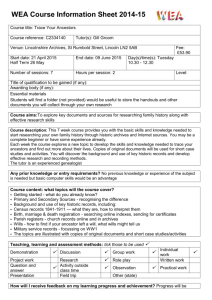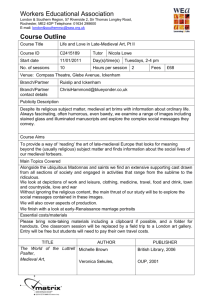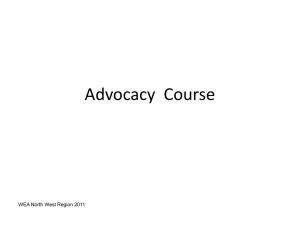Course Outline
advertisement
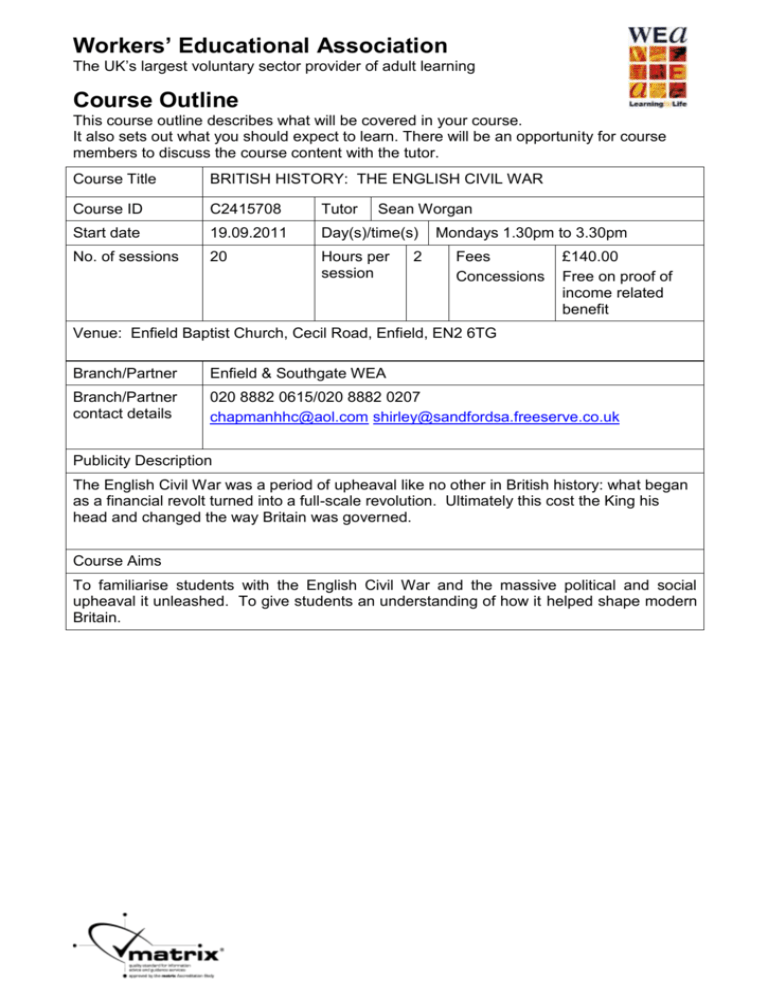
Workers’ Educational Association The UK’s largest voluntary sector provider of adult learning Course Outline This course outline describes what will be covered in your course. It also sets out what you should expect to learn. There will be an opportunity for course members to discuss the course content with the tutor. Course Title BRITISH HISTORY: THE ENGLISH CIVIL WAR Course ID C2415708 Tutor Start date 19.09.2011 Day(s)/time(s) No. of sessions 20 Hours per session Sean Worgan 2 Mondays 1.30pm to 3.30pm Fees Concessions £140.00 Free on proof of income related benefit Venue: Enfield Baptist Church, Cecil Road, Enfield, EN2 6TG Branch/Partner Enfield & Southgate WEA Branch/Partner contact details 020 8882 0615/020 8882 0207 chapmanhhc@aol.com shirley@sandfordsa.freeserve.co.uk Publicity Description The English Civil War was a period of upheaval like no other in British history: what began as a financial revolt turned into a full-scale revolution. Ultimately this cost the King his head and changed the way Britain was governed. Course Aims To familiarise students with the English Civil War and the massive political and social upheaval it unleashed. To give students an understanding of how it helped shape modern Britain. Main Topics Covered 1) Puritanism vs creeping Absolutism: Resisting Charles, Wentworth and Laud 2) Parliament and Charles’ financial problems: Scotland, the Bishops’ War, and the Short Parliament 3) Revolt in Ireland and the Grand Remonstrance 4) Nineteen Propositions, Charles’ arrest of Five MPs and the beginning of the Civil War 5) Battle of Edgehill, and Stewart victories at Adwalton Moor and Roundaway Down 6) Solemn League and Covenant, First Battle of Newbury, 7) Marston Moor, Second Battle of Newbury 8) Fairfax, Cromwell and the New Model Army 9) Naseby and Charles’ Surrender to the Scots 9) Putney Debates 10) Charles Escapes, Engagers and the Second Civil War 11) Rump Parliament, Trial and Execution of Charles I 12) Diggers and Levellers 13) Cromwell in Ireland 14) Fifth Monarchists, the Rule of the Saints and the Barebones Parliament 15) Cromwell and Monck defeat Scots 16) Major Generals and the of Saints 17) Moves to Restoration Pre-course preparation, reading, internet research etc. In terms of reading Maurice Ashley and Christopher Hill are very good and provide contrasting views. However, I would suggest leaving Hill until after learners have gained a general overview of the Civil War and the period: this is also a good rule for specialist subjects, e.g. the role of religion in the Civil War. Learners should be aware that the Civil War and the English Revolution are the same thing, although the latter is more concerned with the later aspects. Websites can also be a valuable source of information: BBC History, Spartacus School Net and Wikipedia and are useful, but History on the Net and Open2net are very good, offering overviews of events in the Civil War, maps, quizzes, timelines and other resources. As always, students should be wary of Wikipedia since mistakes, deliberate or otherwise, have been known – although this is less of a problem for historical subjects. The WEA is committed to equality of opportunity and inclusive learning. WEA London and Southern Regions' Support Centre 57 Riverside 2, Sir Thomas Longley Road, Rochester, Kent ME2 4DP Tel: 01634 298600 Fax: 01634 298601 email: london&southernrsc@wea.org.uk The Workers' Educational Association is a charity registered in England and Wales (number 1112775) and in Scotland (number SC039239) and a company limited by guarantee registered in England and Wales (number 2806910) TITLE AUTHOR The English Civil War The King’s War 1641-1647 Rebellion or Revolution: England From the Civil War to the Restoration The British Republic 1649-60 Oliver Cromwell and the Puritan Revolution Cromwell: Our Chief of Men The World Turned Upside Down: Radical Ideas During the English Revolution Ehud’s Dagger: Class Struggle in the English Revolution The Far Left in the English Revolution The English Bible and the Seventeenth-Century Revolution. The Century of Revolution 1603-14 PUBLISHER Maurice Ashley C.V. Wedgewood G.E. Aylmer Budding Books Book Club Association Oxford University Press Ronald Hutton Maurice Ashley Macmillan English University Press Antonia Fraser Christopher Hill Panther James Houlston Verso Brian Manning Christopher Hill Bookmarks Christopher Hill Nelson Essential costs/materials Notebook, pens. Entry Requirements/Level Since it is set at level three reading and comprehension will be a significant part of the course, both generally and in terms of specific texts provided. Some prior knowledge of the period would also be helpful to the student. While not essential this is highly desirable since it will make things easier for the learner later on. This course is placed at Level 3. Qualification gained N/A Awarding Body N/A Teaching and learning methods used Lectures, discussions, Q &As, source material comprehension exercises, reading, individual planned presentations, and where available videos. The WEA is committed to equality of opportunity and inclusive learning. WEA London and Southern Regions' Support Centre 57 Riverside 2, Sir Thomas Longley Road, Rochester, Kent ME2 4DP Tel: 01634 298600 Fax: 01634 298601 email: london&southernrsc@wea.org.uk The Workers' Educational Association is a charity registered in England and Wales (number 1112775) and in Scotland (number SC039239) and a company limited by guarantee registered in England and Wales (number 2806910) Learning Outcomes By the end of the course learners will be able to: 1. Identify the main actors and events in the English Civil War. 2. Recognise the social, cultural, economic and political factors involved. 3. Demonstrate an understanding of specific groups brought to prominence by the Civil War. 4. Assess the importance of these groups in shaping the social, cultural and political landscape. 5. Demonstrate an understanding of the role of religion as a transmission mechanism for social, cultural and political values of the groups involved. 6. Evaluate the importance of the Civil War in changing the British political landscape. How do you know you are learning? There will be quizzes, diaries, presentations, Q&As, regular informal feedback on progress, and collection of evidence of learning (including work done outside the classroom). Your Learner Record will ask you to consider how far you feel you have progressed. Suggested Further Study and Progression Routes There may be scope for a WEA follow up course if learners want it, possibly covering a specific aspect of the Civil War in greater detail, Stuart and Cromwellian Ireland for instance. The Kingston Summer School runs a course on Tudor and Stuart London, which includes the English Civil War on the syllabus. If students wish to gain a qualification, OCR exam board covers the Civil War as an AS Level topic, and the syllabus includes document studies. At degree level the Open University covers the Civil War in even greater detail. Finally, various history societies throughout London run talks on aspects of the English Civil War, learners can gain details of these by checking their local society’s website: details of this can often be found in the local library. Brief tutor profile Earlier this year I gained a Ph.D. in history and will be looking to incorporate many of the skills I learnt into this course. I will employ a holistic approach, which looks at social, cultural, economic and political factors and the interaction between them. As part of this I will also be utilising some of the knowledge I gained whilst studying, looking in particular at the role of Dissenting religious groups: these played a major role during the Civil War and I will be looking social and political activities in particular. This is my second year teaching for the WEA, but I previously spent three years teaching at Havering College. During this time I have developed a more interactive teaching style, incorporating guidance from me through lectures, and learner focused learning through reading, discussions and Q&As. As part of an interactive approach I frequently incorporate the examination of different sources into my lessons, and hope to pay particular attention to them as part of this course. If you would like more information about other WEA courses, please contact WEA London and Southern Regions’ Support Centre. You can now enrol and pay online. Go to: www.wea.org.uk The WEA is committed to equality of opportunity and inclusive learning. WEA London and Southern Regions' Support Centre 57 Riverside 2, Sir Thomas Longley Road, Rochester, Kent ME2 4DP Tel: 01634 298600 Fax: 01634 298601 email: london&southernrsc@wea.org.uk The Workers' Educational Association is a charity registered in England and Wales (number 1112775) and in Scotland (number SC039239) and a company limited by guarantee registered in England and Wales (number 2806910)
